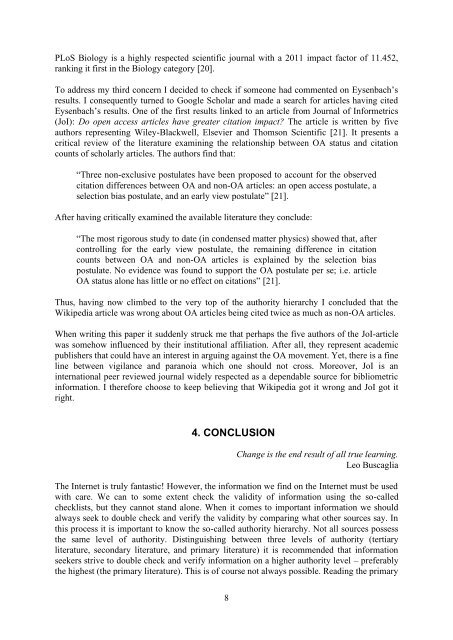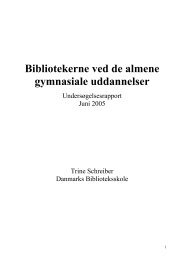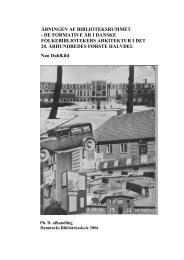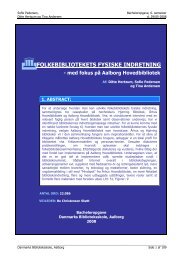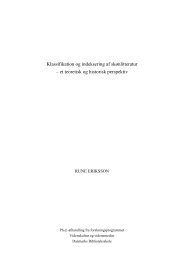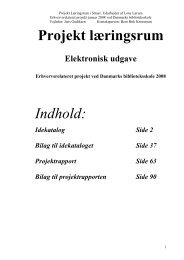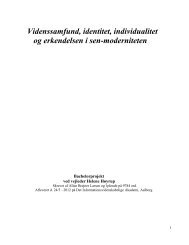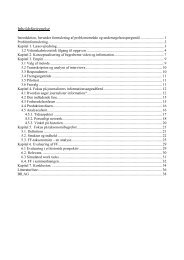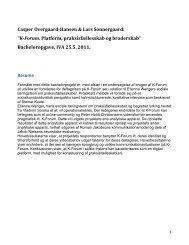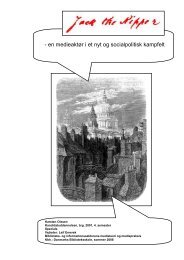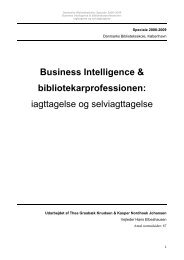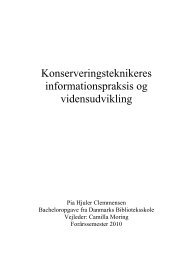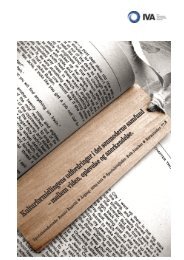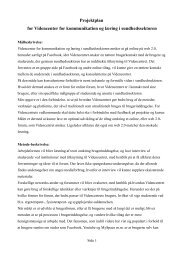how to detect misinformation on the internet
how to detect misinformation on the internet
how to detect misinformation on the internet
You also want an ePaper? Increase the reach of your titles
YUMPU automatically turns print PDFs into web optimized ePapers that Google loves.
PLoS Biology is a highly respected scientific journal with a 2011 impact fac<str<strong>on</strong>g>to</str<strong>on</strong>g>r of 11.452,<br />
ranking it first in <strong>the</strong> Biology category [20].<br />
To address my third c<strong>on</strong>cern I decided <str<strong>on</strong>g>to</str<strong>on</strong>g> check if some<strong>on</strong>e had commented <strong>on</strong> Eysenbach’s<br />
results. I c<strong>on</strong>sequently turned <str<strong>on</strong>g>to</str<strong>on</strong>g> Google Scholar and made a search for articles having cited<br />
Eysenbach’s results. One of <strong>the</strong> first results linked <str<strong>on</strong>g>to</str<strong>on</strong>g> an article from Journal of Informetrics<br />
(JoI): Do open access articles have greater citati<strong>on</strong> impact? The article is written by five<br />
authors representing Wiley-Blackwell, Elsevier and Thoms<strong>on</strong> Scientific [21]. It presents a<br />
critical review of <strong>the</strong> literature examining <strong>the</strong> relati<strong>on</strong>ship between OA status and citati<strong>on</strong><br />
counts of scholarly articles. The authors find that:<br />
“Three n<strong>on</strong>-exclusive postulates have been proposed <str<strong>on</strong>g>to</str<strong>on</strong>g> account for <strong>the</strong> observed<br />
citati<strong>on</strong> differences between OA and n<strong>on</strong>-OA articles: an open access postulate, a<br />
selecti<strong>on</strong> bias postulate, and an early view postulate” [21].<br />
After having critically examined <strong>the</strong> available literature <strong>the</strong>y c<strong>on</strong>clude:<br />
“The most rigorous study <str<strong>on</strong>g>to</str<strong>on</strong>g> date (in c<strong>on</strong>densed matter physics) s<str<strong>on</strong>g>how</str<strong>on</strong>g>ed that, after<br />
c<strong>on</strong>trolling for <strong>the</strong> early view postulate, <strong>the</strong> remaining difference in citati<strong>on</strong><br />
counts between OA and n<strong>on</strong>-OA articles is explained by <strong>the</strong> selecti<strong>on</strong> bias<br />
postulate. No evidence was found <str<strong>on</strong>g>to</str<strong>on</strong>g> support <strong>the</strong> OA postulate per se; i.e. article<br />
OA status al<strong>on</strong>e has little or no effect <strong>on</strong> citati<strong>on</strong>s” [21].<br />
Thus, having now climbed <str<strong>on</strong>g>to</str<strong>on</strong>g> <strong>the</strong> very <str<strong>on</strong>g>to</str<strong>on</strong>g>p of <strong>the</strong> authority hierarchy I c<strong>on</strong>cluded that <strong>the</strong><br />
Wikipedia article was wr<strong>on</strong>g about OA articles being cited twice as much as n<strong>on</strong>-OA articles.<br />
When writing this paper it suddenly struck me that perhaps <strong>the</strong> five authors of <strong>the</strong> JoI-article<br />
was some<str<strong>on</strong>g>how</str<strong>on</strong>g> influenced by <strong>the</strong>ir instituti<strong>on</strong>al affiliati<strong>on</strong>. After all, <strong>the</strong>y represent academic<br />
publishers that could have an interest in arguing against <strong>the</strong> OA movement. Yet, <strong>the</strong>re is a fine<br />
line between vigilance and paranoia which <strong>on</strong>e should not cross. Moreover, JoI is an<br />
internati<strong>on</strong>al peer reviewed journal widely respected as a dependable source for bibliometric<br />
informati<strong>on</strong>. I <strong>the</strong>refore choose <str<strong>on</strong>g>to</str<strong>on</strong>g> keep believing that Wikipedia got it wr<strong>on</strong>g and JoI got it<br />
right.<br />
4. CONCLUSION<br />
Change is <strong>the</strong> end result of all true learning.<br />
Leo Buscaglia<br />
The Internet is truly fantastic! However, <strong>the</strong> informati<strong>on</strong> we find <strong>on</strong> <strong>the</strong> Internet must be used<br />
with care. We can <str<strong>on</strong>g>to</str<strong>on</strong>g> some extent check <strong>the</strong> validity of informati<strong>on</strong> using <strong>the</strong> so-called<br />
checklists, but <strong>the</strong>y cannot stand al<strong>on</strong>e. When it comes <str<strong>on</strong>g>to</str<strong>on</strong>g> important informati<strong>on</strong> we should<br />
always seek <str<strong>on</strong>g>to</str<strong>on</strong>g> double check and verify <strong>the</strong> validity by comparing what o<strong>the</strong>r sources say. In<br />
this process it is important <str<strong>on</strong>g>to</str<strong>on</strong>g> know <strong>the</strong> so-called authority hierarchy. Not all sources possess<br />
<strong>the</strong> same level of authority. Distinguishing between three levels of authority (tertiary<br />
literature, sec<strong>on</strong>dary literature, and primary literature) it is recommended that informati<strong>on</strong><br />
seekers strive <str<strong>on</strong>g>to</str<strong>on</strong>g> double check and verify informati<strong>on</strong> <strong>on</strong> a higher authority level – preferably<br />
<strong>the</strong> highest (<strong>the</strong> primary literature). This is of course not always possible. Reading <strong>the</strong> primary<br />
8


